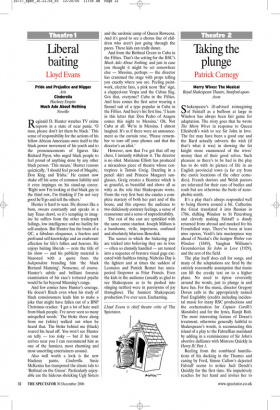Liberal baiting
Lloyd Evans
Pride and Prejudice and Niggas Arts Cinderella Hackney Empire Much Ado About Nothing Novello Reginald D. Hunter watches TV crime reports in a state of near panic. ‘O man, please don’t let them be black.’ This sense of responsibility for the actions of his fellow African Americans owes itself to the black power movement of his youth and to the pronouncements of figures like Richard Pryor, who urged black people to feel proud of anything done by any other black person. ‘This means,’ Hunter reasons quizzically, ‘I should feel proud of Mugabe, Don King and Trisha.’ He cannot now shake off his sense of common liability and it even impinges on his stand-up career. ‘Right now I’m looking at that black guy in the third row, I’m thinking if I’m not very good he’ll go and tell the others.’ Hunter is hard to scan. He dresses like a bum, swears constantly and speaks in a lazy Texas drawl, so it’s tempting to imagine he suffers from the other trailerpark failings, low intelligence and no facility for self-analysis. But Hunter has the brain of a QC, a fabulous eloquence, a fearless and profound self-knowledge and an exuberant affection for life’s follies and horrors. He enjoys baiting liberals — note the title of his show — and his publicity material is blazoned with a quote from the Independent branding him ‘the black Bernard Manning’. Nonsense, of course. Hunter’s subtle and brilliant forensic examination of his race’s tortured psyche would be far beyond Manning’s range.
And few comics have Hunter’s courage. He doesn’t flinch even when his study of black consciousness leads him to make a joke that might have fallen out of a BNP Christmas cracker. ‘I get a lot of hate mail from black people. I’ve never seen so many misspelled words.’ The bloke three along from me (white) walked out when he heard that. The bloke behind me (black) roared his head off. You won’t see Hunter on telly — too risky — but if his tour arrives near you I can recommend him as one of the funniest, most charming and most unsettling entertainers around.
Also well worth a look is the new Hackney panto, Cinderella. Susie McKenna has transposed the classic tale to ‘Bethnal on the Green’. Particularly enjoyable are the hideous shrieking Ugly Sisters and the sardonic camp of Queen Roweena. And it’s good to see a chorus line of children who aren’t just going through the paces. These kids can really dance.
And from the Bethnal Green to Cuba in the Fifties. That’s the setting for the RSC’s Much Ado About Nothing, and just in case you thought it might be set somewhere else — Messina, perhaps — the director has crammed the stage with props telling you exactly where you are. Peeling paintwork, electric fans, a pink neon ‘Bar’ sign, a clapped-out Vespa and the Cuban flag. Got that, everyone? Cuba in the Fifties. And here comes the first actor wearing a flannel suit of a type popular in Cuba in the Fifties. And here’s his first line. ‘I learn in this letter that Don Pedro of Aragon comes this night to Messina.’ Oh. Not Cuba at all. We’re in Messina. I almost laughed. It’s as if there were an announcement as the curtain rose, ‘Please remember to turn off your phones and that the director’s an idiot.’ However, now that I’ve got that off my chest, I instantly withdraw it. The director is no idiot. Marianne Elliott has produced a miraculous piece of theatre whose centrepiece is Tamsin Greig. Dazzling in a pencil skirt and Princess Margaret sunglasses, Greig creates a Beatrice which is as graceful, as beautiful and above all as witty as the role that Shakespeare wrote. From the very first beat she exudes a complete mastery of both her part and of the house, and this exposes the audience to two deliciously contrary feelings, a sense of reassurance and a sense of unpredictability.
The rest of the cast are sprinkled with the same comic stardust. Joseph Millson is a handsome, virile, impetuous, confused and absolutely hilarious Benedick.
The scenes in which the bickering pair are tricked into believing they are in love — often so clumsily handled — are turned into a sequence of bravura visual gags executed with faultless timing. Nicholas Day is the lightest and at times the saddest of Leonatos and Patrick Romer has unexpected firepower as Friar Francis. Even the kids in the audience (usually as glad to see Shakespeare as to be pushed into stinging nettles) were in paroxysms of joy throughout. The funniest Shakespeare production I’ve ever seen. Enchanting.




































 Previous page
Previous page